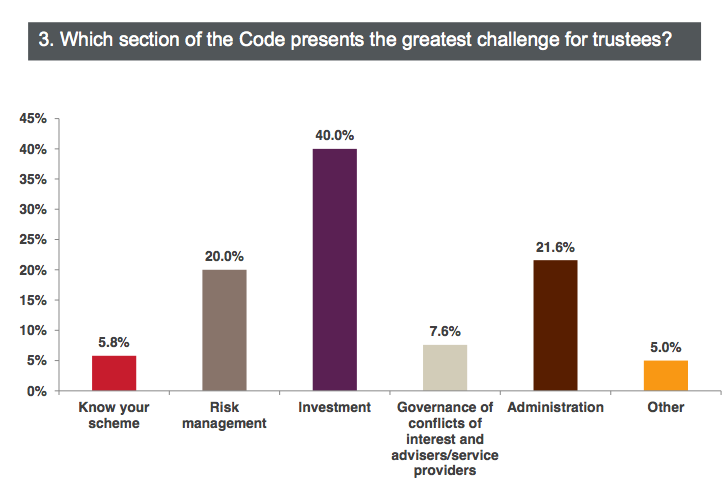A quarter (25%) of pension trustees surveyed believe their scheme is not at all compliant with The Pension Regulator’s (TPR) new code of practice for trust-based defined contribution (DC) pensions, according to research by law firm Sackers.
Its research, which surveyed 44 pension trustees at the 2013 National Association of Pension Funds’ (NAPF) annual conference and 78 respondents via the Pensions Management Institute (PMI) website, found that only half of respondents’ pension schemes are seen as fully compliant with the code, while around 20% are mostly compliant and 5% are partially compliant.
The code, which was published in July 2013, is expected to take effect from November.
The research also found:
- 82% of respondents said there should be a requirement to demonstrate a scheme’s compliance with the code and TPR’s guidance.
- Around 40% cited meeting investment requirements as the greatest challenge presented by the code, followed by risk management and administration.
- Only 23% of respondents had completed both TPR’s trustee toolkit and a PMI qualification, while 9% held neither qualification.
Helen Ball, partner at Sackers, said: “The DC code is a big step for the pensions industry.
“Trustees that are unsure about their scheme’s ability to fully comply with the code should address this as a matter of urgency to guarantee that they are equipped to meet the high standards identified by [TPR] as the benchmark of a quality DC scheme.
“The results of our poll show that, although some trustees will need to roll up their sleeves and make changes to their current practice, many schemes have already taken steps to improve their governance and administration.
“This is really an opportunity for those trustees to demonstrate how hard they have been working to help their members.
“The introduction of the DC code could also offer a platform for trustees that are seeking better member engagement, because even the best-run DC schemes will need members to play their part if DC schemes are to reach their full potential.”

nettikasino – nettikasinot – http://fotografiabodasmx.com